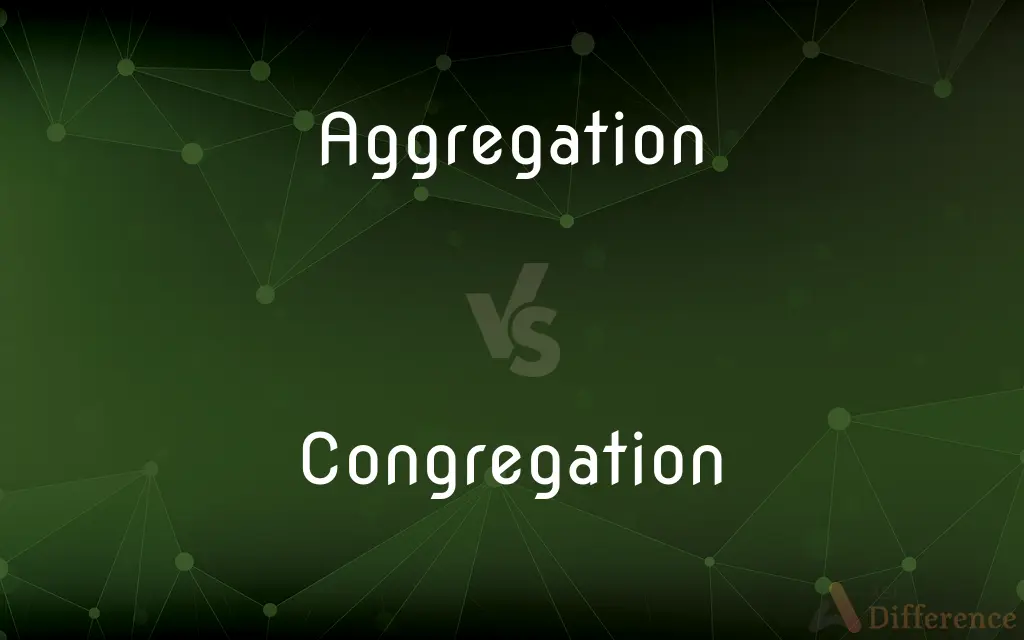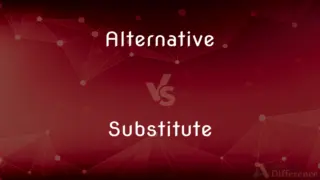Aggregation vs. Congregation — What's the Difference?
Edited by Tayyaba Rehman — By Fiza Rafique — Updated on May 12, 2024
Aggregation refers to the collection of items into a group, often used in data and biology, while congregation specifically denotes a gathering of people, usually for religious purposes.

Difference Between Aggregation and Congregation
Table of Contents
ADVERTISEMENT
Key Differences
Aggregation involves the assembly of various elements, such as data, objects, or organisms, into a unified whole. On the other hand, congregation is primarily used to describe a group of people coming together, often in a religious context.
In the realm of data science, aggregation is a process that summarizes data from multiple sources, providing insights into large datasets. Whereas, in religious or community settings, congregation refers to the act of individuals assembling for worship or communal activities.
Biologically, aggregation can describe phenomena where organisms group together for social, environmental, or survival benefits. In contrast, congregation, when used outside its usual religious connotation, can imply a more organized or purposeful assembly of people.
The concept of aggregation can be applied in various contexts like statistics, where it denotes the combining of numerical values. Meanwhile, congregation is mostly associated with a gathering in a place of worship or meeting.
Aggregation often implies a functional or utilitarian purpose behind the grouping, such as forming a larger entity or simplifying information. Conversely, congregation typically involves a social or spiritual intent, emphasizing community and shared experiences.
ADVERTISEMENT
Comparison Chart
Primary Context
Data, biology, materials
Religious gatherings, meetings
Purpose
Summarization, combination, collection
Worship, community assembly, shared activities
Common Usage
Data aggregation, particle aggregation
Church congregation, congregational meeting
Implication of Gathering
Often non-social, functional
Social, often with a spiritual or communal goal
Examples in Sentences
Aggregated data simplifies analysis.
The congregation met weekly at the church.
Compare with Definitions
Aggregation
Collection of data.
Aggregation of survey results helps in statistical analysis.
Congregation
Coming together for a purpose.
The congregation of activists became a powerful voice for change.
Aggregation
Formation of a mass.
The aggregation of mud at the riverbank affected the water flow.
Congregation
Group meeting in a church.
The church’s congregation gathered for the annual general meeting.
Aggregation
Assembly of elements.
The aggregation of diverse ideas led to a comprehensive project proposal.
Congregation
Gathering for worship.
The congregation increased in size after the new pastor arrived.
Aggregation
Grouping of particles.
The aggregation of particles can be observed in colloidal solutions.
Congregation
Assembly of people.
The congregation at the lecture was impressive.
Aggregation
Summing up quantities.
Aggregation of expenses showed a higher than expected financial outlay.
Congregation
The act of assembling.
Aggregation
Constituting or amounting to a whole; total
Aggregate sales in that market.
Congregation
A body of assembled people or things; a gathering.
Aggregation
(Botany) Crowded or massed into a dense cluster.
Congregation
A group of people gathered for religious worship.
Aggregation
Composed of a mixture of minerals separable by mechanical means.
Congregation
The members of a specific religious group who regularly worship at a church or synagogue.
Aggregation
A total considered with reference to its constituent parts; a gross amount
"An empire is the aggregate of many states under one common head" (Edmund Burke).
Congregation
A religious institute in which only simple vows, not solemn vows, are taken.
Aggregation
The mineral materials, such as sand or stone, used in making concrete.
Congregation
A division of the Curia.
Aggregation
To gather into a mass, sum, or whole
Aggregated the donations into one bank account.
Congregation
The act of congregating or collecting together.
Aggregation
To amount to; total
Revenues will aggregate more than one million dollars.
Congregation
A gathering of faithful in a temple, church, synagogue, mosque or other place of worship. It can also refer to the people who are present at a devotional service in the building, particularly in contrast to the pastor, minister, imam, rabbi etc. and/or choir, who may be seated apart from the general congregation or lead the service (notably in responsory form).
Aggregation
To collect (content from different sources on the internet) into one webpage or newsreader.
Congregation
A Roman Congregation, a main department of the Vatican administration of the Catholic Church.
Aggregation
To come together or collect in a mass or whole
"Some [bacteria]aggregate so closely as to mimic a multicellular organism" (Gina Kolata). "The first stars began to form when hydrogen and helium gas left over from the Big Bang aggregated into dense clouds" (Paul Davies).
Congregation
A corporate body whose members gather for worship, or the members of such a body.
Aggregation
The act of collecting together (aggregating).
Congregation
Any large gathering of people.
Aggregation
The state of being collected into a mass, assemblage, or sum (aggregated).
Congregation
A flock of various birds, such as plovers or eagles.
Aggregation
A collection of particulars; an aggregate.
Congregation
The main body of university staff, comprising academics, administrative staff, heads of colleges, etc.
Aggregation
(networking) Summarizing multiple routes into one route.
Congregation
The act of congregating, or bringing together, or of collecting into one aggregate or mass.
The means of reduction in the fire is but by the congregation of homogeneal parts.
Aggregation
(epidemiology) The majority of the parasite population concentrated into a minority of the host population.
Congregation
A collection or mass of separate things.
A foul and pestilent congregation of vapors.
Aggregation
(object-oriented programming) Kind of object composition which does not imply ownership.
Congregation
An assembly of persons; a gathering; esp. an assembly of persons met for the worship of God, and for religious instruction; a body of people who habitually so meet.
He [Bunyan] rode every year to London, and preached there to large and attentive congregations.
Aggregation
The act of aggregating, or the state of being aggregated; collection into a mass or sum; a collection of particulars; an aggregate.
Each genus is made up by aggregation of species.
A nation is not an idea only of local extent and individual momentary aggregation, but . . . of continuity, which extends in time as well as in numbers, and in space.
Congregation
The whole body of the Jewish people; - called also Congregation of the Lord.
It is a sin offering for the congregation.
Aggregation
Several things grouped together or considered as a whole
Congregation
A body of cardinals or other ecclesiastics to whom as intrusted some department of the church business; as, the Congregation of the Propaganda, which has charge of the missions of the Roman Catholic Church.
Aggregation
The act of gathering something together
Congregation
The assemblage of Masters and Doctors at Oxford or Cambrige University, mainly for the granting of degrees.
Congregation
The name assumed by the Protestant party under John Knox. The leaders called themselves (1557) Lords of the Congregation.
Congregation
A group of people who adhere to a common faith and habitually attend a given church
Congregation
An assemblage of people or animals or things collected together;
A congregation of children pleaded for his autograph
A great congregation of birds flew over
Congregation
The act of congregating
Congregation
Collective term for a group of people.
The entire congregation participated in the charity event.
Common Curiosities
What is the primary context where 'aggregation' is used?
Aggregation is commonly used in data management, biology, and physical sciences.
What is the difference in the purpose of aggregation vs. congregation?
Aggregation typically aims to combine elements for analytical or structural purposes, while congregation focuses on community and shared activities.
Can aggregation apply to people?
Yes, although less common, aggregation can refer to the gathering of people, usually in a non-religious context.
Are there specific industries where 'aggregation' is particularly important?
Yes, industries such as finance, insurance, and technology frequently use aggregation to analyze data, reduce risk, and streamline processes.
Can 'congregation' be used outside of religious contexts?
Yes, 'congregation' can be used more broadly to refer to any large gathering of people, although it is most commonly associated with religious gatherings.
How is 'congregation' primarily used?
Congregation is predominantly used to describe groups of people gathering, especially for religious services.
In what situations might one use 'aggregation' in everyday language?
In everyday language, one might use 'aggregation' to refer to the collection or combination of various items, such as news, information, or statistics.
How does the usage of aggregation and congregation differ in professional settings?
In professional settings, aggregation might refer to the summarization of data or resources, whereas congregation could refer to the assembly of colleagues for meetings or corporate events.
How does data aggregation work?
Data aggregation involves collecting and summarizing information from various sources to create a consolidated dataset, often used for analysis or reporting.
What role does 'congregation' play in community building?
Congregation plays a crucial role in community building as it fosters a sense of belonging and collective identity among participants, particularly in religious and community-focused organizations.
Share Your Discovery

Previous Comparison
Methodical vs. Methodological
Next Comparison
Alternative vs. SubstituteAuthor Spotlight
Written by
Fiza RafiqueFiza Rafique is a skilled content writer at AskDifference.com, where she meticulously refines and enhances written pieces. Drawing from her vast editorial expertise, Fiza ensures clarity, accuracy, and precision in every article. Passionate about language, she continually seeks to elevate the quality of content for readers worldwide.
Edited by
Tayyaba RehmanTayyaba Rehman is a distinguished writer, currently serving as a primary contributor to askdifference.com. As a researcher in semantics and etymology, Tayyaba's passion for the complexity of languages and their distinctions has found a perfect home on the platform. Tayyaba delves into the intricacies of language, distinguishing between commonly confused words and phrases, thereby providing clarity for readers worldwide.
















































